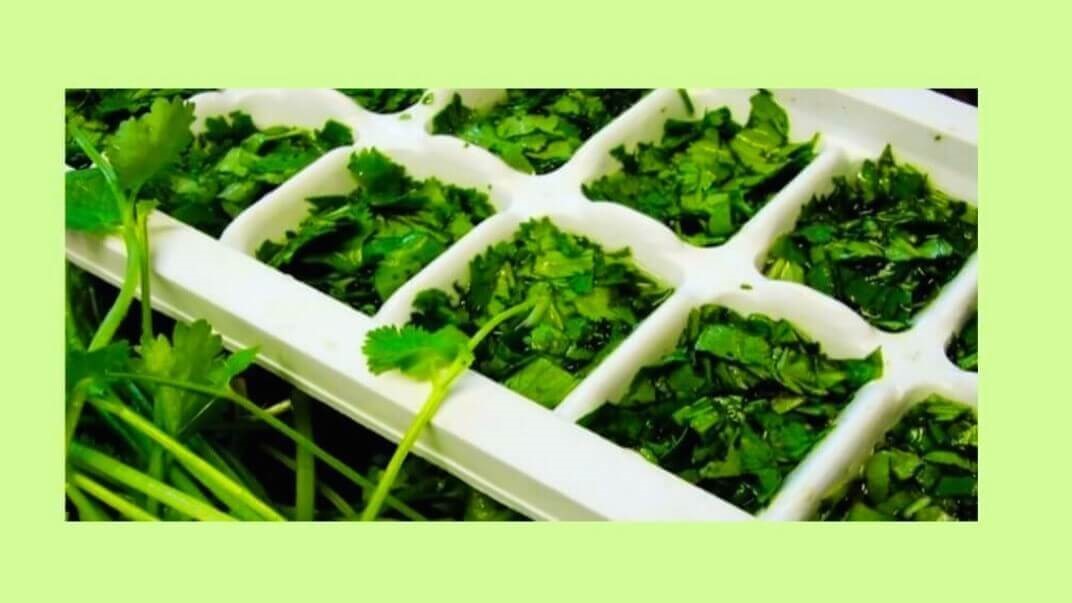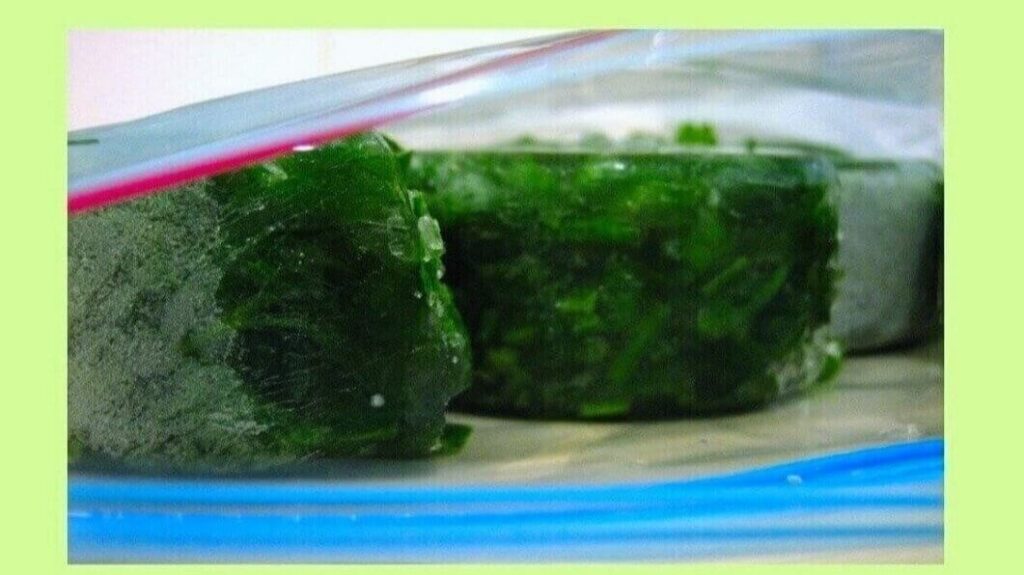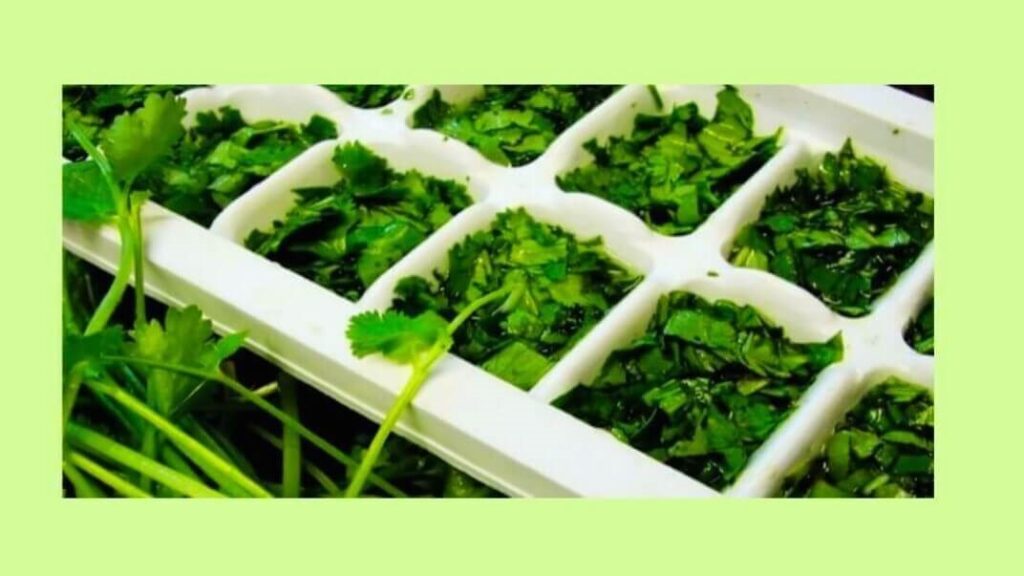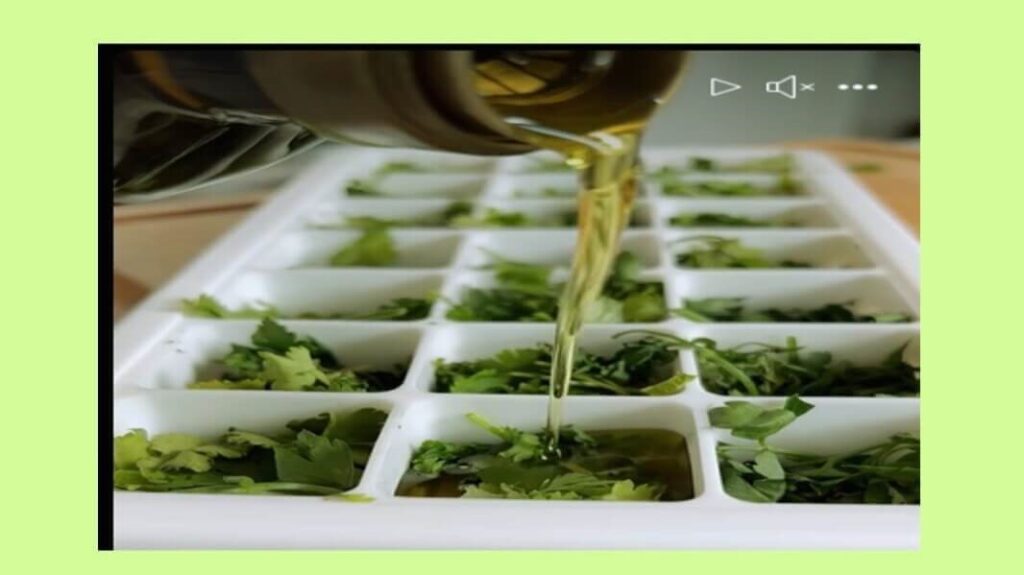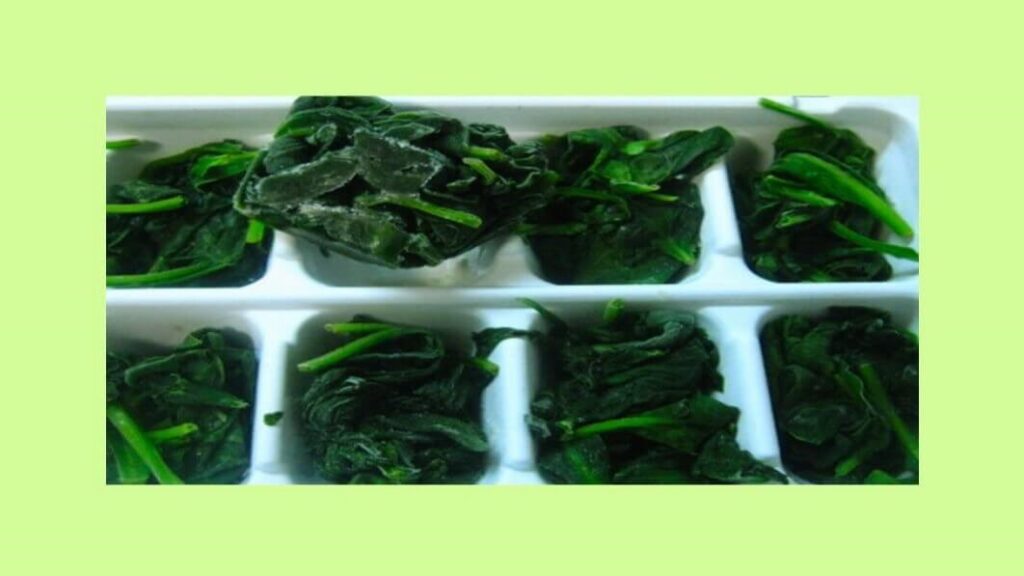Herbs add a unique flavor, aroma, and freshness to our meals – along with a range of health benefits. However, the biggest challenge is the short shelf life of these herbs. They become wilt, fade in color, and lose their flavor within just a few days, making it difficult to store and use them efficiently. It often leads to waste and frustration in the kitchen. So, can you freeze fresh herbs to make them last longer? The answer is yes, and this method is also one of the simplest ways to preserve their flavor and nutrients. In this article, we will explore freezing fresh herbs, its benefits, the best and worst herbs to freeze, a step-by-step freezing guide, and common mistakes to avoid.
Can You Freeze Fresh Herbs from the Garden?
Yes, you can freeze fresh herbs from the garden. If you harvest herbs like parsley, basil, mint, coriander, or thyme in your garden, then freezing is best to preserve their flavor and aroma for later use. So, if you are wondering if you can freeze fresh herbs for later use, the answer is yes. Since fresh herbs tend to spoil fast, freezing helps to extend their shelf life. Freezing also helps conserve the nutrition of herbs better, then the drying method.
Why freezing is effective? Freezing of fresh herbs slows down the growth of microbes responsible for spoilage of herbs. Frozen herbs may become soft after freezing, but they still retain their flavor and taste great in cooked dishes like soups, stews, and sauces.
Benefits of Freezing Fresh Herbs
- Retains Flavor & Aroma – Are you wondering if you can freeze fresh herbs without losing their taste? The good news is that freezing helps lock the natural oils and aroma, especially in soft herbs like basil, mint, or parsley. Freezing leads to a lesser loss of flavor than drying and keeps the herbs flavorful.
- Reduces Waste – The most frustrating thing in the kitchen is the spoiling of fresh herbs without being able to use them properly. In such a scenario, freezing fresh herbs can be helpful. Without getting waste, freezing lets you store fresh herbs for future use.
- Extended Shelf Life – Fresh herbs can keep their freshness, taste, and flavor for a few days only. They tend to wilt, becoming bitter in taste and losing texture real fast. When frozen properly, they can be used for a year. However, it is recommended to use them within 3-6 months for best quality.
- Time Saver – Pre-chopped, frozen fresh herbs come in handy when you have to cook in hurry.
- Preserves Nutrition – Compared to traditional drying, freezing herbs is a better way to retain their nutrients and keep their natural goodness intact.
- Budget Friendly – Throwing away spoiled herbs isn’t just annoying but also a waste of money. Freezing them for future use is a smart way to save both herbs and cash.
- Ideal for Home Gardeners – If you grow herbs, it is often asked ‘Can you freeze fresh herbs from the garden?’. Yes, freezing is a great way to enjoy your favorite herbal flavor all year long.

Best Herbs for Freezing
Some herbs are better suited for freezing, while others are more ideal for drying. Here’s a list of herbs that freeze well:
- Basil
- Chives
- Dill
- Lemongrass
- Lemon balm
- Mint
- Oregano
- Parsley
- Sage
- Savory
- Tarragon
- Thyme
Can You Freeze Fresh Herbs in Ice Trays with Water? A Step-by-Step Guide
If you ever wondered “Can you freeze fresh herbs in water?” – the answer is yes. It is one of the easiest yet effective methods for preserving fresh herbs to be used later in any of your cooked dishes. Here’s a simple, step-by-step method using ice cube trays:
- Prepare the Herbs – Wash your fresh herbs from the garden or grocery store to remove any dirt, impurities, or bugs. Pat dry them using a clean kitchen towel to avoid the formation of ice crystals.
- Chop the Herbs – Once dry, cut all the fresh leaves from their stems. Remove spoiled or yellowing leaves. Finely chop the fresh, healthy leaves.
- Fill the Tray – Take one clean ice cube tray and place one spoon of chopped herbs in every compartment. Do not overfill the compartments with the herbs, leaving about one-third of the space for water.
- Add First Layer of Water – Pour a small amount of water into each section – sufficient for partially covering the herbs. Gently press the herbs down with the help of a spoon to help them stay submerged.
- Freezing the Herbs – Put the tray in the freezer and let it freeze until solid. It usually takes a few hours or overnight.
- More Water for Freezing – Once the herbs are frozen, take out the ice tray and pour additional water into each cube slot. This will ensure that herbs are fully encased in the ice and prevent freezer burn, a condition where the food item is exposed to air inside the freezer.
- Final Freezing – Put the tray back in the freezer and allow it to freeze completely.
- Transfer & Store – Once the herbs are completely frozen, remove the frozen herb cubes and transfer them into a labeled zip-lock freezer bag or airtight container. Put the name of the herb on the bag with the date for easy tracking.
- Use as Needed – Take out the frozen herb cubes whenever you want to use them in your cooked dishes like soups, sauces, and stews.
Freezing fresh herbs in water is a convenient and smart solution to keep them readily available all year round. It is also a definite yes to your query, “Can you freeze fresh herbs?”
Can You Freeze Fresh Herbs in Oil? A Step-by-Step Guide
Can you freeze fresh herbs in another way that makes them readily available while keeping their flavor and color intact? Yes, freezing fresh herbs in oil is another effective method of preserving them. Here’s a step-by-step guide for freezing using the oil:
- Prepare the Herbs – Wash your fresh herbs from the garden or grocery store to remove any dirt, impurities, or bugs. Pat dry them using a clean kitchen towel to avoid the formation of ice crystals.
- Chop the Herbs – Once dry, cut all the fresh leaves from their stems. Remove spoiled or yellowing leaves. Finely chop the fresh, healthy leaves.
- Put them in the Tray – Take a clean ice tray and put 1 tablespoon of chopped herbs in each of its compartment.
- Add Olive Oil – Pour extra virgin olive oil into each section of the ice tray so that the herbs are fully covered with oil. You can use the oil of your choice, but olive oil is the most common.
- Freeze the Tray – Place the tray in the freezer and allow it to freeze. This may take a few hours or overnight.
- Transfer and Store – Remove the frozen herb oil cubes from the tray and transfer them into an airtight freezer bag with a zip or an airtight container. Put the name of the herb with the date on the bag or container to keep track.
- Ready to Use – These handy herb oil cubes are perfect for sautéing vegetables, garnishing soups, or adding to sauces.
Can You Freeze Fresh Herbs in the Olive Oil?
Yes, definitely. Freezing fresh herbs in olive oil is a popular way of preserving herbs. This method gives you a flavorful oil base for your recipes, saving both time and effort in the kitchen. However, there is one safety point that you must keep in your mind. When fresh herbs or garlic are stored in oil at room temperature or even in the fridge, it can create an environment for harmful bacteria Clostridium botulinum, responsible for foodborne illness. Do the following steps to avoid this:
- Chop the herbs before mixing them with olive oil.
- Gently heat the oil until you can smell the strong aroma from the herbs – this helps release their flavor.
- Let the oil cool down quickly.
- Pour the mixture into an ice cube tray and freeze it.
- Whenever you need cubes for cooking, take them out from the freezer and melt them slowly in a pan on low heat.
This method of freezing goes very well with basil.
Can You Freeze Fresh Herbs Whole?
Yes, you can freeze fresh whole as well, especially if they are firm and sturdy like rosemary, sage, thyme, or bay leaf. These herbs have strong stems and leaves that can stay well in the freezer. Simply spread the herbs flat in a single layer on a tray and freeze them until they are solid. Once frozen, move them into a freezer bag or containers and squeeze out as much air as possible to prevent freezer burn.
Softer herbs like basil, mint, or cilantro, don’t freeze as well whole as this changes their texture, making them mushy. For soft herbs, freeze them with a little oil or chopping them first to get better results.
Freezing Herb Blends
Ever asked, “Can you freeze fresh herbs in some other wonderful manner?”. Yes, another exciting way is by making herb blends. Instead of freezing herbs individually, you can mix multiple soft-leafy herbs to make your own ready-to-use pastes. It is also a great way of saving time during cooking. Here’s a step-by-step guide to make a simple herb blend paste:
- Choose soft herbs like basil, parsley, chives, mint, oregano, cilantro, or dill.
- Clean them properly to remove all the dirt, and dry them using a soft, clean kitchen towel.
- Once dry, remove leaves from the stems.
- Blend them in a food processor with a small amount of olive oil until smooth.
- Put the paste into ice cube trays for freezing.
- Once frozen, transfer the cubes into labeled and air-tight freezer bags or containers.
Dos and Don’ts of Freezing Fresh Herbs – Pro Tips
Freezing fresh herbs, the right way is crucial. Here’s a list of some dos and don’ts that must be kept in mind to get the best freezing results:
Dos
- Use Fresh, Healthy Herbs – The basis of ‘Can you freeze fresh herbs?’ starts with the quality herbs. Always choose herbs that are fresh, vibrant, and free from yellowing or wilting. Wash them properly to remove any dirt or bugs.
- Thorough Drying before Freezing – One of the most important steps when learning how can you freeze fresh herbs is to pat them completely dry. Moisture can lead to the formation of ice crystals, and ruin their texture.
- Consider Blanching (Optional) – Blanching herbs like parsley or basil before freezing can help preserve their color, flavor, and texture. This helps deactivate the enzymes responsible for deterioration and reduce freezer burn.
- Choose the Right Freezing Method – There are many ways to freeze herbs – whole, chopped, or preserved in water or oil. Choose the method that suits your cooking habit.
- Use Airtight Storage – Transferring the frozen herbs into airtight containers or freezer bags is yet another crucial step that must be done correctly. You must squeeze out all excess air to prevent freezer burn and maintain their aroma and flavor.
- Label and Date Everything – Label each bag or container with the name of the herb and the date it was frozen. This helps in identifying the herbs easily and using the older batches first.
- Portion for Convenience – Freeze herbs in easy-to-use portions, like 1 tbsp per ice cube, so you can use them directly in your recipes without thawing the entire batch.
Don’ts: Mistakes to Avoid
- Don’t Use Spoiled or Wilted Herbs – Can you freeze fresh herbs that are past their prime? No, freezing will not improve their quality. Avoid freezing herbs that are discolored, spoiled, or wilted.
- Never Freeze Wet Herbs – Excess moisture in herbs can build ice crystals and damage their texture. Always ensure the herbs are completely dried before freezing.
- Don’t Overfill Trays – Whether freezing herbs in water or oil, avoid overfilling the ice cube trays. It can lead to overflow and uneven freezing.
- Don’t Skip Pre-Freezing When Needed – If you are freezing herbs flat (like in zip bags), pre-freezing them on a tray helps prevent clumping. This makes it easier to use them later.
- Avoid Overloading the Freezer – Putting too many unfrozen items in the freezer can raise its temperature, affecting the freezing quality of your herbs.
- Don’t Use Frozen Herbs as Garnish – Frozen herbs lose their crisp texture once thawed. They are suitable for soups, sauces, and stews and not as toppings.
- Don’t Freeze for Too Long – While freezing extends the shelf life, herbs left too long can lose flavor and quality. To ensure the quality of your dishes, use frozen herbs within 3 to 6 months of freezing.
Takeaway Message
Herbs are the healthiest way to give a distinct flavor to your dishes. Drying herbs is the most conventional way of preservation. Mechanization has led to the discovery of newer ways of preserving herbs. This led to obvious curiosity “Can you freeze fresh herbs?”. Freezing is a modern technique of saving herbs, ensuring that their color, texture, nutrition, flavor, and quality remain top-notch when done correctly. Try freezing your home-grown or store-bought fresh herbs and relish them all year long!
Disclaimer: The views expressed in this article are the writer’s opinions and should not be considered a substitute for an expert’s advice.
Also Read: Oregano Herb Tea Benefits, Side Effects, & Recipes
10 Best Herbs for Hair Growth and Strength 2025
Arjun Chaal Powder Benefits: Remarkable Ayurvedic Herb
Q1.) What is the best way to freeze fresh herbs?
Ans.) There is no one-size-fits-all answer to this. The best way to freeze fresh herbs depends on the type of herb and how you are planning to use it in your cooking. If you are freezing soft, leafy herbs, then freeze them in oil or water for best results. For hardy herbs, freezing them whole works well. For quick and easy availability of herbs, chop and freeze them in portions.
Q2.) How long do fresh herbs last in the freezer?
Ans.) Freezing fresh herbs is an excellent way of making them available for an extended period. However, to maintain the quality of your cuisines it is advised to use them within 3-6 months of freezing.
Q3.) Should fresh herbs be washed before freezing?
Ans.) Washing fresh herbs before freezing is an important step that should not be missed. Washing removes dirt, bugs, and other impurities from herbs and ensures that you get the best quality freezing.

